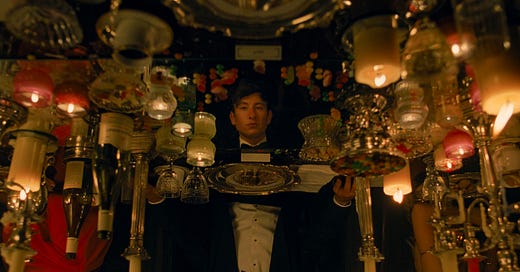
Last week, CNN hosted a town-hall with Donald Trump, and the reaction among most media observers is that it went pretty poorly for CNN. Even CNN insiders seemed to be pretty unhappy with how the night went. As expected, Trump was given a platform to spew lies, and even if the moderator had been able to keep up, he firehoses at such speed and velocity you can’t really nail him down or fact-check him in real time (I’m skeptical the approach outlined here would work). Furthermore, you can’t “trap him in a lie” since he has no shame or fidelity to the truth. So, for example, when he says the 2020 election was stolen, there’s no amount of proof to the contrary that can make him say, “Well maybe I’m mistaken.” His entire persona rests on him being perceived as a winner surrounded by foes who want to bring him down. That’s the brand. He’s not going to change it simply because it’s a lie.
While we can put the onus on individual players—CNN head Chris Licht for organizing the Town Hall in the first place or Kaitlan Collins for being the wrong moderator for the job—I wanted to pull back a bit and look at the larger problem that not just CNN but the mainstream media faces with the upcoming election: how do you remove one party from your coverage of a two-party system and look reasonable? If Trump is the GOP nominee (and all indications are that he will be), then don’t you have to cover him?
The quick and easy answer to this coverage is that Trump is good for ratings. I’m not sure how much I buy that argument in 2023. In 2015/2016, that was undoubtedly true. Every news network played with fire assuming they wouldn’t get burned. We were all (myself included) so sure that he could not win that we didn’t see the harm in giving him loads of free air time to show every rally and every horrible thing he did. Sure, he was a disaster, but there was no way he could win, so we’ll all laugh at the sideshow clown, Clinton will win in a walk, and then we’ll get to the next conflict of a Republican congress fighting the first female President. We’re all so smart.
The problem in 2023 isn’t that Trump is good for ratings. If that were true, The Apprentice wouldn’t have consistently dropped off year after year. As a character, Trump is one-dimensional. I was a bit stunned that Licht tried to spin the evening to CNN employees as “there is so much we learned last night of what another Trump presidency looked like.” You mean he lies constantly and hates being challenged on those lies? Yeah, man. We know. That’s not news, and it’s not particularly interesting. We got four years of “The Trump Show,” and in addition to the sheer devastation it caused, it also became boring. What dumb thing will he tweet today? What’s the latest palace intrigue? Who’s Trump’s new best friend who will inevitably get on his bad side in the next two months? To see this as a ratings boon is to assume that Apprentice reruns are a goldmine.
The real problem is this: We have a two-party political system. Theoretically, these political parties have disputes and may find the other distasteful, but they share larger values like free elections, democratic norms, etc. To put it in terms of game (which the media loves to do), fans of the Atlanta Falcons and fans of the New Orleans Saints don't like each other’s teams, but everyone can agree that the Falcons don’t get to blow up the stadium if they lose. As far apart as Democrats and Republicans could be on policy, there were presumably some norms holding them together.1
That has changed in recent years where Republicans simply do no see Democrats or their voters as legitimate participants in America. You can see this not only with gerrymandering and voter ID laws, but recently with how representatives in Tennessee and Montana have been expelled or silenced for voicing their opinions as if their constituents have no right to representation.
Unfortunately, the mainstream media is a ref that has been throughly worked through decades of Republicans decrying “liberal bias” as if Wolf Blitzer is getting up every day and saying, “The proletariat will suffer in vain no longer!” The media, by virtue of any pushback against Republican talking points, is labeled “biased” and the media, seeking to show itself as a neutral arbiter and objective in delivering the news, has accepted this critique to where it is no longer doing journalism. It’s main goal is not objectivity, but the appearance of objectivity, and that’s the problem we have now.
Licht, in attempting to disassemble and provide an explanation for why they had the town hall, said to employees, the “mistake the media made in the past is ignoring that those people exist just like you cannot ignore that President Trump exists.” You may be able to make the argument that the media overlooked those people in 2015/2016, but then we had about four years of Trump Safari pieces of people in diners reassuring reporters they they thought the the guy they voted for was doing a good job, so I don’t think that argument holds water. But the second part of Licht’s statement is valuable: “You cannot ignore that President Trump exists.”
Mainstream media hasn’t solved this quandary because to address the problem honestly would look like bias even though it’s the truth. The media desperately wants Trump to be normal. It’s why there are so many stories about him pivoting or running a more traditional campaign and so on and so forth, and none of that is true, but they need it to be true because it’s the only way the game they’ve built can work. How do you cover a candidate that wanted to overthrow the government? Say, “Well that’s an interesting point of view, let’s see how it plays for him in the polls.” You take an abnormal candidate and an abnormal party (as destroying democratic norms is now orthodoxy in the Republican Party), and you say, “Well, this is just what they believe. It’s up to the American People to decide.”
That’s not journalism, and I think even Licht knows that. But he feels like he can’t ban Trump from CNN. To do that would break the appearance of objectivity, which is more important to the business than journalism. While this isn’t a new phenomenon (I don’t think Trump broke the media in 2015/2016 as much as he exploited a weakness that had been building for decades), the town hall appearance made it abundantly clear that a major news organization doesn’t feel comfortable drawing a line and saying, “You can’t come on air and spew lies in front of a friendly audience.” They want to sell a more comforting view of an America that no longer exists where we have two parties with differences but that we all believe in democratic norms and that we’re one country. That’s not the truth, but it’s a lie agreed upon, and that’s what sells.
This is not to say that American Democracy has always been some perfect instrument, and we have to acknowledge how many Americans—particularly Black Americans—have been cut out of that system to where we didn’t really have a true democracy until after the Voting Rights Act, which has now been gutted after Holder v Shelby County.
















Great piece, Matt. I found this article helpful in guiding my thinking on this topic. https://www.nytimes.com/2022/11/12/opinion/election-midterm-pattern.html
Another great piece, Matt. There are elements of the media willing to call a spade a spade when it comes to shifts in the Republican Party, though they’re not running the C-suites at CNN. They’re also not typically garnering lots of eyeballs on television either, though MSNBC tries. Mostly they’re the modern equivalent of print magazine political reporters, and even then. It’s all so demoralizing.